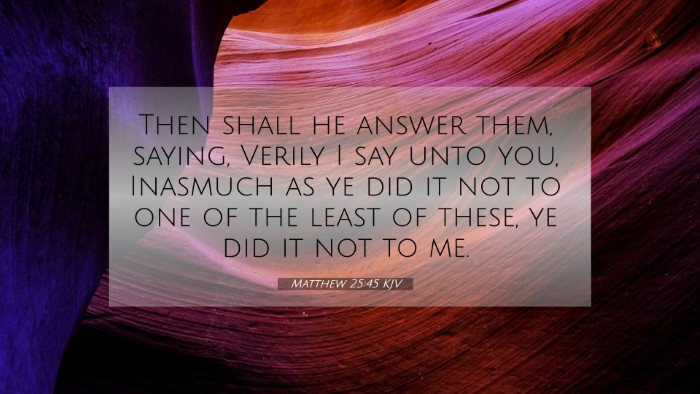Understanding Matthew 25:45
This verse states: "Then shall He answer them, saying, Verily I say unto you, Inasmuch as ye did it not to one of the least of these, ye did it not to Me." This proclamation is part of the parable of the sheep and the goats, where Jesus illustrates the importance of how people treat others, emphasizing the connection between their treatment of the vulnerable and their relationship with Christ.
Verse Meaning and Interpretation
In this verse, Jesus addresses the consequences of neglect towards those in need. It highlights a profound principle of Christian living: that our actions towards others reflect our actions towards God Himself. Public domain commentaries provide valuable insights into the depth of this teaching:
- Matthew Henry's Commentary: He elaborates on the idea that when we fail to help those who are marginalized or in distress, we are essentially rejecting Christ. This underscores the necessity of compassion and service as integral to the Christian faith.
- Albert Barnes' Notes: Barnes interprets this verse as an indication of the severity of judgment. He stresses that actions which may seem insignificant can have eternal implications. The 'least of these' represents the vulnerable in society, and neglecting them is tantamount to neglecting Christ.
- Adam Clarke's Commentary: Clarke notes that the phrase "inasmuch as" implies that the acts of kindness or neglect towards others are measured directly against our relationship with God. He emphasizes that this verse encapsulates a core element of Christian morality - the duties we owe to each other.
Bible Cross-References
This verse connects with several other passages that reinforce its message:
- Matthew 7:12: "Therefore all things whatsoever ye would that men should do to you, do ye even so to them." This is the Golden Rule, emphasizing reciprocal kindness.
- James 2:14-17: This passage discusses faith without works being dead, correlating the need for tangible action alongside belief.
- 1 John 3:17-18: It questions how God's love can abide in someone who has worldly goods but does not help a brother in need.
- Luke 3:10-11: John the Baptist instructs people to share with those in need, illustrating practical charity.
- Proverbs 14:31: "He that oppresseth the poor reproacheth his Maker: but he that honoureth him hath mercy on the poor." This verse connects the treatment of the poor with our relationship with God.
- Galatians 6:2: "Bear ye one another's burdens, and so fulfill the law of Christ." This shows the importance of supporting others in need.
- Isaiah 58:6-7: These verses detail the kind of fasting that God desires: to loose the bonds of injustice and help the oppressed.
- Matthew 10:42: A similar sentiment, where Jesus mentions that even a cup of cold water given in His name will not go unrewarded.
- John 13:34-35: Jesus gives a new commandment to love one another, showing that love is the hallmark of His followers.
- Romans 12:13: "Distributing to the necessity of saints; given to hospitality." This emphasizes the community aspect of faith.
Thematic Connections
Matthew 25:45 not only illustrates a personal moral imperative but also serves as a thematic bridge connecting various biblical teachings on love, compassion, and justice. These connections can be understood through:
- Tools for Bible Cross-Referencing: Utilizing tools like a Bible concordance or cross-reference guides can enhance understanding of interconnected themes within scripture.
- Sermon Preparation: This verse can be pivotal for sermon preparation, linking teachings about social justice with the core message of the Gospel.
- Comparative Bible Verse Analysis: Drawing parallels between this verse and others enhances interpretative depth and offers a holistic view of Christian responsibilities.
- Inter-Biblical Dialogue: Engaging with both Old and New Testament passages allows for a richer understanding of how God's expectations for His people have remained consistent throughout history.
Conclusion
The essence of Matthew 25:45 encapsulates a foundational ethic of Christianity: that our treatment of others is a reflection of our relationship with Christ. This verse beckons believers to engage actively in acts of service and compassion, challenging them to evaluate their faith by the lens of their actions. By employing methods of cross-referencing and thematic analysis, one can uncover the rich tapestry of interconnected teachings that highlight the importance of love, both in practical terms and spiritual significance.
Final Reflections
To fully grasp the implications of this scripture, Christians are encouraged to examine other verses that relate to serving the needy. Such reflections not only grow one’s understanding of communal and individual duty but also deepen the believer’s relationship with God, manifesting the love of Christ in the world.














